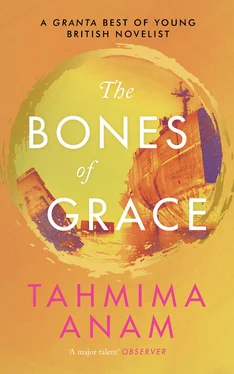As soon as I told Rashid I was pregnant it was as if I’d crawled into his head and turned on all the lights. He didn’t know how close I’d come to not saying anything, how many times I’d contemplated having an abortion. But it was — and I must tell you this, Elijah, though it will pain you — it was a moment of communion between us. When I woke up the next morning, there was a tray on the bedside table with tea, vitamins, and a bunch of tulips. God knows how he’d procured the tulips. I was thrilled when he agreed not to tell his parents, and we spent the next several weeks on a conspiratorial high. Every time we looked at each other, we widened our eyes and smiled. Every chance he got, he put his hands on my belly. We did things that people have done throughout the ages. We guessed the sex. We argued over names. We made cooing sounds to it, to each other. He told me repeatedly how beautiful I looked. He made love to me with extreme tenderness. It was everything it needed to be, and for the first time in our marriage I experienced a complete absence of dissatisfaction.
And then, as suddenly as it had appeared, the little knot of cells vanished. We were gathered around the top of Dolly’s twelve-seater dinner table, the five of us — Rashid and me, Dolly and Bulbul, his brother Junaid — and we’d just been presented with trifle, Dolly’s favourite dessert, served in a very large glass bowl. Rashid was passing the bowl to me, and as I turned to take it from him I felt a hot, abrupt pain scissoring through me. I grabbed his elbow as the pain intensified, watching in horror as a crimson stain travelled across my lap and towards my knees. Rashid was still holding the trifle bowl, and he set it down. The others were eating, dessert forks clipping against porcelain, custard and Jell-O smudged across their plates.
Rashid stood up and asked his father and his brother to leave the room. Junaid protested, saying he wasn’t finished, but Bulbul saw the look on Rashid’s face and ordered the boy out. When they had gone, I said to Dolly, ‘I’m very sorry, but I’m afraid I’ve spoiled your dining chair.’ The upholstery was stained beyond repair, I knew that even before I stood up, because I was sitting now in a pool of blood, the remnants of that much cursed, little-wished-for, newly coveted being smeared all over the cream-and-navy fabric. Dolly and Rashid pulled me up from that chair, very slowly, and Dolly wrapped a shawl around my waist, and we went up the stairs and into the bathroom, where I climbed quietly into the empty bathtub in my clothes. It wasn’t until much later, the tub filled, swirls of light and dark pink filtering into the water, that I let Rashid pull the kameez over my head. And then I lay there for a long time, swimming with the evaporating atoms of my child, utterly, excruciatingly alone.
It was suggested — after the doctor, and the scans, and the assurance that no irreparable damage had been done — that I should spend a few weeks in the southern port town of Chittagong, where Rashid’s family owned a country house. I had been there twice before — once on a summer holiday with my parents, and again just after the wedding, when Dolly and Bulbul had held a reception for that branch of the family. I agreed easily when the proposal was put to me, but I didn’t want anyone else to come. I thought they might refuse to let me go alone, but I found there was some power in what had happened, and I was allowed to dictate the terms, at least for now.
I also insisted that my parents shouldn’t know anything, especially my mother. Ammoo was preparing for the trial of Hossain Hashmi Kubul, a notorious war criminal who had spent the last forty years bragging about his wartime exploits, daring anyone to prosecute him. He had invested in land just after liberation, then started a cement factory that supplied all the building companies in the capital, and he was a powerful man — in the last government, he had even been given a ministry. Everyone knew he had done things, that he was a Razakar, but the tribunal needed witnesses, and Ammoo had found a family who had known him in ’71, a farmer and his ageing father who had seen Kubul ordering the Razakars to mow down all the men in the area and torch their houses. She was with the lawyers day and night, preparing the witnesses, finding supporting documents, scouring the area for anyone who might back up their story. She couldn’t know about my little hiccup. Every time I saw her I told her how wonderful everything was, and the clouds parted around her face, and I saw that there was no space in her for anything but the lightest of conversations.
I packed a suitcase of my old clothes and took the first flight out on a Wednesday morning. Rashid tried at the last minute to get me to change my mind, but I had to put some distance between us. The spell was broken. I couldn’t stop thinking about the look on his face when he realised what was happening, the slight censure that would have reared itself, and him batting it back, shielding me from the truth: that it would have saved us, and without it, we were once again adrift. He drove me to the airport, promising to fly down on Friday. A driver picked me up at the other end, and the caretaker, Joshim, greeted me at the front door.
Khondkar Villa was a modest, two-storey house built by Bulbul’s father in the 1950s. It had a large living room that opened onto a sloping garden. Outside, the bougainvillaea and its bright, flame-like blossoms dominated the landscape, and beyond the garden there were old trees, and more sloping earth, the cars and asphalt of the city nowhere in sight. Chittagong was a smaller version of Dhaka, with the same kinetic pace, the same political graffiti and billboards for shampoo and long-haul flights and mobile-phone packages. But here, elevated above the streets, the city retained its old character as a hill station, a place where the air was cool and empty and lightened by its proximity to the sea.
In the vacant house, the cook, Komola, reigned supreme. She ordered me to wash my hands and then she brought me a tray and ordered me to eat. I was surprised to find I still had a big appetite. The homemade guava jelly and white bread reminded me of childhood summers, when Nanu used to make big batches from the tree in her garden and I would stick a spoon directly into the pot and burn my tongue on the cloyingly sweet paste. Komola filled the guest bathtub and ordered me to get in, but not before she had given me a thorough massage with olive oil. The oil was warm and Komola’s hands were comfortably rough, and I slept deeply that night and woke up refreshed.
Rashid came on Friday and declared me better. ‘Let’s party,’ he said, jangling the car keys in his pocket. ‘I know everyone in this town.’ Komola stood in the doorway with a bowl of rice pudding in her hands. I told Rashid I wasn’t going anywhere. I know he wanted to help me fix it, to cheer me out of it, but it was obvious, in this case, that whatever was in his arsenal would not be enough. I spooned rice pudding onto my plate and pretended not to see his disappointment.
He went out after dinner and didn’t come back till very late, climbing into bed beside me and running his hands up and down my body. ‘Make love to me,’ he whispered, his breath fragrant with alcohol, and I went through the motions, trying to gain comfort from the closeness of our bodies, but eager for the visit to be over so I could be alone in the house again. What would I say to you, Elijah, if we were still in touch? What song title would communicate, now, the complicated forms of attachment that had been promised and taken away from me? We had stopped sending messages soon after the wedding. The last one I sent was an unencrypted sentence that delivered the news in its blandest form. Married. Happy. Farewell .
Читать дальше












